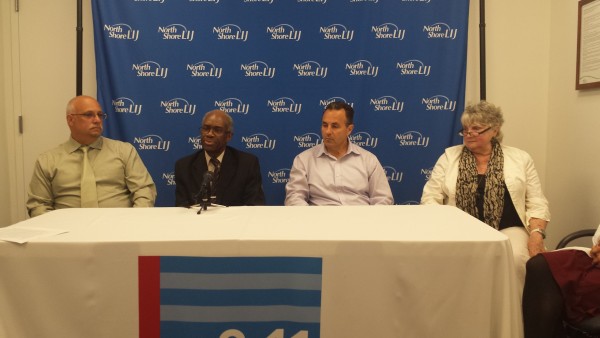By Michael Cusenza South & West Forum

9/11 first responders and volunteers John Licato (from l.), Christian Foggy, Joseph Ramondino and Patricia Workman. Photo by Michael Cusenza
On Feb. 14, 2013, John Licato’s life flashed before his eyes; the eyes that this retired city police officer thought had witnessed it all—from the indescribable joy of the birth of his grandchildren, to the agony of human suffering at the hands of terrorists. And it was with those eyes that he watched his doctor inform him he had a malignant tumor in his neck.
“My Valentine’s Day gift,” he said with a smile tinted with a hint of sarcasm. That Tuesday took Licato’s mind back to another harrowing Tuesday, and what would ultimately become the cause of his cancer. On the morning of September 11, 2001, Licato, a Howard Beach resident, was finishing up his midnight tour at the 110th Precinct in Corona when he heard about the attack on the Twin Towers. He raced downtown— and stayed working at Ground Zero for months after his nation and city were forever altered.
Licato, 51, was changed as well. The 26-year Navy veteran’s health began to gradually decline. About 11 years later, he felt a lump on the side of his neck. Convinced it was simply a swollen gland, he visited his physician, Dr. Lecher in Howard Beach, who ordered a CAT scan and MRI, and referred Licato to a specialist. Biopsy results proved to be the beginning of the end of the life Licato had led up to that Valentine’s Day.
“’My God, I’m going to die,’” he recalled thinking to himself. “’Is my will up to date?’” Licato recounted the moment he found out he had cancer, and the months of intense chemotherapy and radiation that followed, this week at the North Shore-Long Island Jewish Queens World Trade Center Clinical Center of Excellence in Rego Park. After praising the clinic doctors and staff, Licato proudly announced that his cancer is now in remission.
On Monday, he was joined by three other 9/11 first responders who have also become clinic clients to discuss their stories of survival and the need for Congress to reauthorize the James Zadroga 9/11 Health and Compensation Act. The main parts of the bill that provide treatment—including funding for facilities such as the Queens Boulevard clinic—and compensation are set to expire in October 2015 and October 2016.
“Please consider the needs of the constituency,” said Christian Foggy, 67, a retired NYPD civilian electrician who lives in Jamaica and was declared prostate cancer-free last summer. “Please consider any bill or program that could be used to help survivors and their families. I think [Congress] will do the right thing.”
Dr. Jacqueline Moline, the vice president and chairwoman of population health at NS-LIJ, called this a solemn week in New York as it recalls memories “of those we lost, but also acts of heroism.” She said that is why reauthorizing the act is so crucial. “These programs provide hope and a way for us in the medical community to give back,” Moline noted. “As we speak, more and more people are getting sick,” added Joseph Ramondino , a Maspeth resident who spent two months at Ground Zero. “We have to stay diligent and keep funding [the clinic.]”
While the future of the Zadroga Act remains uncertain, Licato and his fellow first responders made one thing clear on Monday: Even if they had the opportunity, they wouldn’t change a thing. Even if it meant facing constant pain again; drinking nothing but Boost nutritional drinks again, because the chemo killed his appetite and he can’t keep solid food down; or losing his voice again for six weeks because “the radiation fried everything.”
“I would do it again,” said Licato, without a hint of hesitation. “In a heartbeat.”

